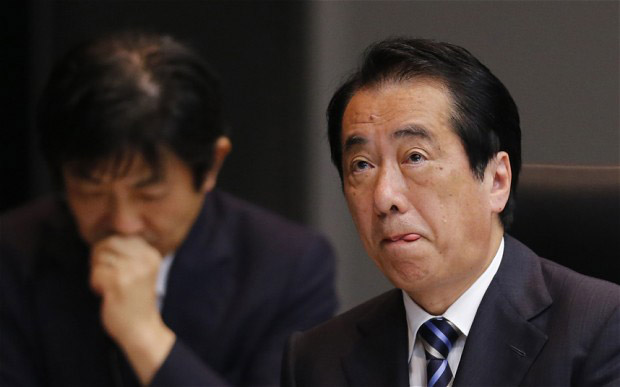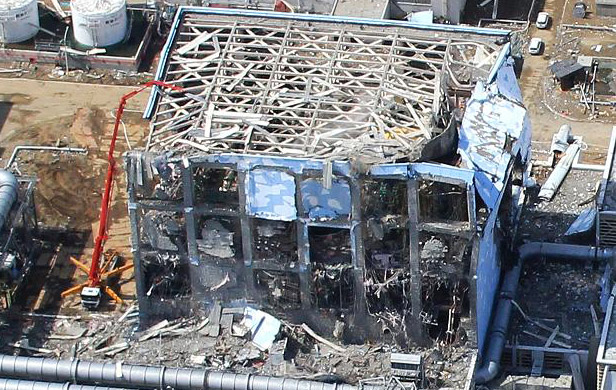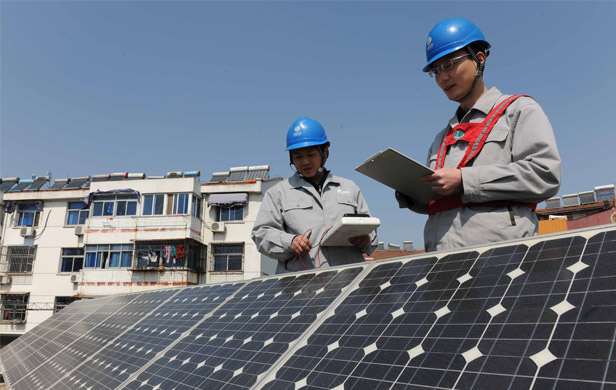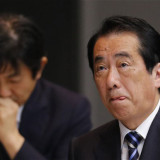
Former Japanese Prime Minister Naoto Kan (2010-2011) addresses the Fukushima Daiichi nuclear crisis which happened on his watch. While his decision to continue propping up the grossly negligent Tokyo Electric Power Company is disappointing, his bold vision for an end to nuclear power should be a clarion call for the world’s nuclear powers.
The accident at the Fukushima Daiichi Nuclear Power Plant was the most severe accident in the history of mankind. At Unit 1, the fuel rods melted down in about five hours after the earthquake, and molten fuel breached and melted through the reactor pressure vessel. Meltdowns occurred in Units 2 and 3 within one hundred hours of the accident. At around the same time, hydrogen-air blasted in the reactor buildings of Units 1, 3 and 4.
Worst-case scenario: 50 million evacuated

Each reactor building contains a fuel pool to store spent fuel. At one point, there was a possibility of meltdowns in those fuel pools as well. If a meltdown occurs in a fuel pool, which sits outside a reactor, a tremendous amount of radioactive material would be released directly into the atmosphere.
The continuation of such a release could mean the realization of the worst-case scenario: a situation where 50 million people within a 250-kilometer radius of Fukushima, including Tokyo and its greater metropolitan area, would have to be evacuated.
[quote]The accident at the Fukushima Daiichi Nuclear Power Plant was the most severe accident in the history of mankind.[/quote]
Fortunately, the situation was prevented from developing further thanks to the tireless self-sacrificing efforts of the Tokyo Electric Power Company, the Self Defense Forces, the firefighters and the police force to supply cooling water into the reactors and the fuel pools. Indeed, we were so close to seeing the worst-case scenario unfold. Had it reached the worst-case scenario, Japan would have had to suffer from long-term chaos and the tremendous amount of radioactive material released would have impacted other nations as well.
Kan does 180 on nuclear power
Before the Fukushima accident, with the belief that no nuclear accident would happen as long as the safety measures were followed properly, I had pushed the policy of utilizing nuclear power. Having faced the real accident as Prime Minister, and having experienced the situation which came so close to requiring me to order the evacuation of 50 million people, my view is now changed 180 degrees. Although some airplane crashes may claim hundreds of casualties, there are no other events except for wars that would require the evacuation of tens of millions of people.
Avoiding accidents “technically impossible”
In spite of the various measures taken in order to prevent accidents, it is technically impossible to eliminate accidents, especially if human factors such as terrorism are taken into account. Actually, it is not all that difficult to eliminate nuclear power plant accidents. All we need to do is to eliminate nuclear power plants themselves. And that resolution lies in the hands of the citizens.
[quote]It is not all that difficult to eliminate nuclear power plant accidents. All we need to do is to eliminate nuclear power plants themselves.[/quote]
There is another issue. Operating nuclear power plants means creating spent nuclear fuel. It takes enormous amounts of money and time to deal with nuclear waste. What this means is that we are leaving the huge problem of nuclear waste for future generations to care for. There is no other way but to go down in the path toward achieving zero nuclear power, for the sake of our children and grandchildren.
The ability to exterminate ourselves
We humans have created nuclear weapons that have the ability to exterminate ourselves – it’s a fundamental paradox of our existence. People have done many things to prevent nuclear wars. One of the examples is The Treaty on the Non-Proliferation of Nuclear Weapons. On the other hand, rules governing nuclear power plants, except for the ones that prohibit the use of nuclear material for military purposes, are basically left to each nation.
If international rules govern nuclear war, why not power plants?
I believe that we need to have international rules regarding the construction of nuclear power plants, too. Nuclear accidents will happen sometime, somewhere, even though no one can predict when or where. Can we prevent the disastrous situation of forcing many people to evacuate when an accident happens? Is it possible to safely treat nuclear waste? We need international rules to address these concerns.
Healthy energy alternatives exist

It is possible for mankind to get enough energy without relying on nuclear power – by using natural energy such as solar, wind, and biomass. To help curb global warming, we need to stop the use of not only nuclear power but also fossil fuels. If all nations make serious efforts to develop new technologies, I believe it’s more than possible that in fifty years we mankind will have all our energy needs met entirely by natural energy.
[quote]I believe it’s more than possible that in fifty years we mankind will have all our energy needs met entirely by natural energy.[/quote]
For the sake of the human race and of our planet earth, the desirable path is for the entire world to walk in the direction of zero nuclear reliance. I have become firmly convinced of that.
Translated by Junko Abe


I am so glad this man has seen the writing on the wall and he has spoken the truth in a very clear and concise manner. Nuclear power will one day kill every living thing on this planet and it will most likely be the result of human error. We have the ability and science available to harness energy from natural resources, we just don’t have the conviction. Thank you Mr. Kan!